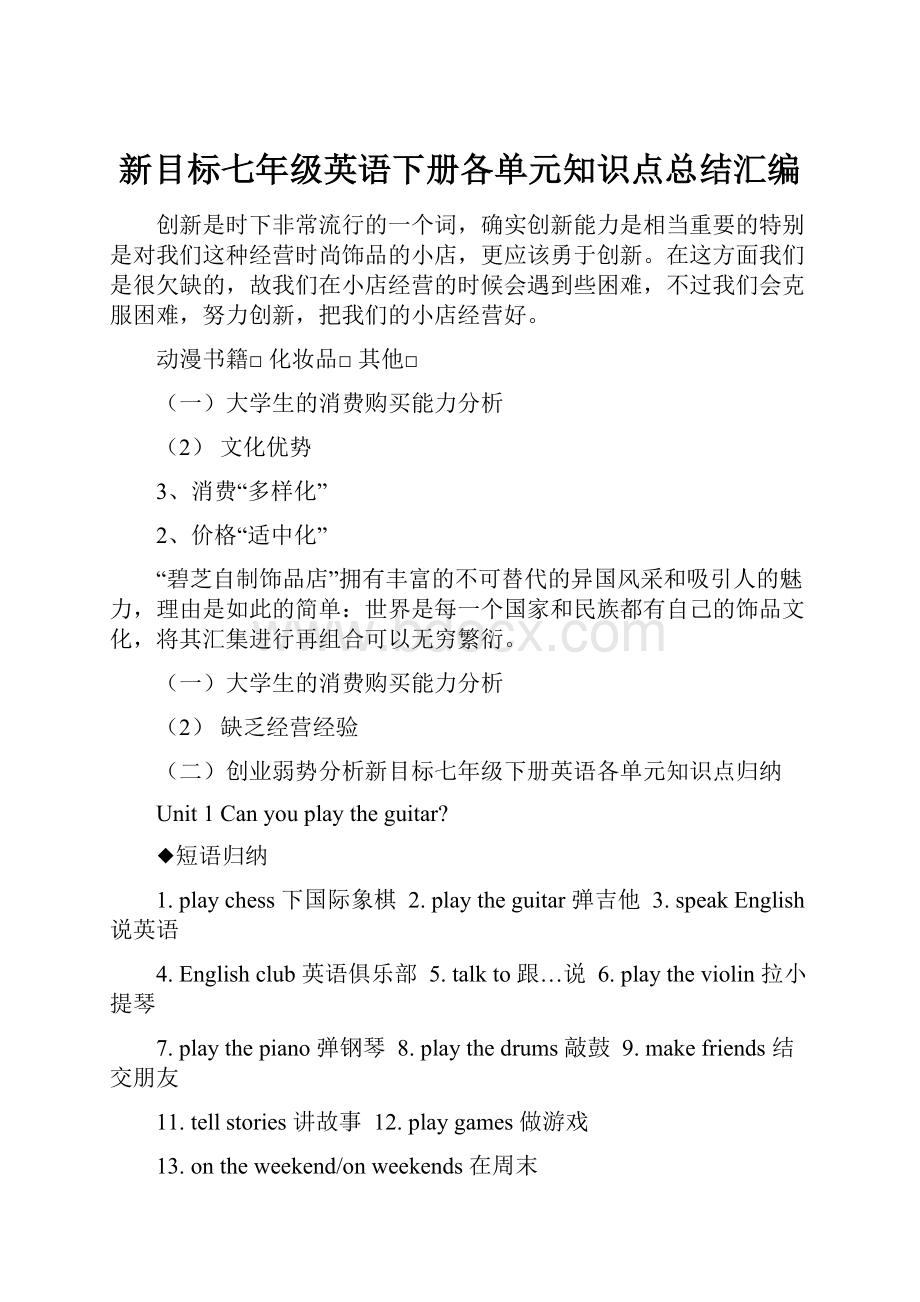新目标七年级英语下册各单元知识点总结汇编.docx
《新目标七年级英语下册各单元知识点总结汇编.docx》由会员分享,可在线阅读,更多相关《新目标七年级英语下册各单元知识点总结汇编.docx(37页珍藏版)》请在冰豆网上搜索。

新目标七年级英语下册各单元知识点总结汇编
创新是时下非常流行的一个词,确实创新能力是相当重要的特别是对我们这种经营时尚饰品的小店,更应该勇于创新。
在这方面我们是很欠缺的,故我们在小店经营的时候会遇到些困难,不过我们会克服困难,努力创新,把我们的小店经营好。
动漫书籍□化妆品□其他□
(一)大学生的消费购买能力分析
(2)文化优势
3、消费“多样化”
2、价格“适中化”
“碧芝自制饰品店”拥有丰富的不可替代的异国风采和吸引人的魅力,理由是如此的简单:
世界是每一个国家和民族都有自己的饰品文化,将其汇集进行再组合可以无穷繁衍。
(一)大学生的消费购买能力分析
(2)缺乏经营经验
(二)创业弱势分析新目标七年级下册英语各单元知识点归纳
Unit1Canyouplaytheguitar?
◆短语归纳
1.playchess下国际象棋2.playtheguitar弹吉他3.speakEnglish说英语
4.Englishclub英语俱乐部5.talkto跟…说6.playtheviolin拉小提琴
7.playthepiano弹钢琴8.playthedrums敲鼓9.makefriends结交朋友
11.tellstories讲故事12.playgames做游戏
13.ontheweekend/onweekends在周末
◆用法集萃
◆典句必背
1.Canyoudraw?
-----Yes,Ican./No,Ican’t.
2.Whatclubdoyouwanttojoin?
-----Iwanttojointhechessclub.
3.YoucanjointheEnglishclub.4.Soundsgood./Thatsoundsgood.
5.IcanspeakEnglishandIcanalsoplaysoccer.6.PleasecallMrs.Millerat555-3721.
7、MayIknowyourname?
我能知道你名字吗?
11、Hecan’tplaytheviolinorthepiano.Canyouhelpkidswithswimming?
12、WhydoyouwanttojointheEnglishclub?
BecauseIwanttolearnEnglishwell.
◆话题写作
DearSir,
Iwanttojoinyourorganization(组织)tohelpkidswithsports,musicandEnglish.MynameisMike.Iam15yearsold.I’mastudentinNo.1Middleschool.Icanplaytheguitarwell.Icansingmanysongs.IcanswimandspeakEnglishwell,too.IthinkIcanbegoodwiththekids.Ialsodowellintellingstories.
Ihopetogetyourlettersoon.
Yours,
Mike
补充:
1.can+动词原形,它不随主语和数而变化。
(1)含有can的肯定句:
主语+can+谓语动词的原形+其他。
(2)变一般疑问句时,把can提前:
Can+主语+动词原形+其他?
肯定回答:
Yes,主语+can。
否定回答:
No,主语+can't.
(3)含有can的否定句:
主语+can't+动词的原形+其他。
(4)含有can的特殊疑问句:
特殊疑问词+can+主语+动词原形+其他?
2.may+动词的原形。
(may为情态动词)一般疑问句是把may提前,
肯定回答是:
Yes,主语+may。
否定回答是:
No,主语+mustn't。
或pleasedon't。
3.“Like+动词ing”表示“喜欢做某事”Ilikeplayingbasketball.Tomlikeslisteningtomusic.
“Like+to+动词”也表示“喜欢做某事”,只是“Like+动词ing”表示习惯性动作(也可以说是爱好),
而“Like+to+动词”表示一次性或短暂性的。
OurPEteacherlikes swimming.(表示爱好)
Helikesplayingbasketball,buttodayhedoesn'tliketoplaybasketball.
他爱好打篮球(爱好),但是今天他没去打篮球(短暂性的)。
4.join+某个组织,俱乐部,party,参军,党派等“加入”
Joinsb.“参加到某人中”
joinin(doing)sth“加入做......,参加某个活动”Joinin=takepartin+活动,比赛
Unit2Whattimedoyougotoschool?
◆短语归纳
1.whattime几点2.gotoschool去上学3.getup起床
4.takeashower洗淋浴5.brushteeth刷牙6.getto到达
7.dohomework做家庭作业8.gotowork去上班9.gohome回家
10.eatbreakfast吃早饭11.getdressed穿上衣服12.gethome到家
13.either…or…要么…要么…14.gotobed上床睡觉
15.inthemorning/afternoon/evening在上午/下午/晚上16.takeawalk散步
17.lotsof=alotof许多,大量18.radiostation广播电台
19.atnight在晚上20.belatefor=arrivelatefor迟到
◆用法集萃
◆典句必背
1.Whattimedoyouusuallygetup?
Iusuallygetupatsixthirty.
2.That’safunnytimeforbreakfast.
3.Whendostudentsusuallyeatdinner?
Theyusuallyeatdinnerataquartertosevenintheevening.
4.Intheevening,IeitherwatchTVorplaycomputergames.
5.Attwelve,sheeatslotsoffruitandvegetablesforlunch..
6.Sheknowsit’snotgoodforher,butittastesgood.
7.Hereareyourclothes.
◆话题写作主题:
谈论日常作息习惯
MySchoolDay
Iamastudent.Iusuallygetupatseven,andIeatbreakfastatseventhirty.ThenIgotoschoolateight.Schoolstartsateightthirty.Ieatlunchattwelve.Igohomeat17:
00.Iofteneatdinnerat19:
00andthenplaythepiano.Idomyhomeworkat20:
00.At22:
00,Igotobed.
补充:
1.whattime和when引导的特殊疑问句。
(1)对时间提问用whattime,也可以用when。
询问钟点时用whattime,询问日期、月份、年份时用when。
(2)询问做某事的时间时,两者可以互换。
(3)其他询问时间的句子:
What'sthetime?
=Whattimeisit?
现在几点了?
2.always总是>usually通常>often通常>sometimes有时>seldom很少>never从不
3.watch+TV、球赛“观看,观赏”,特指长时间注视。
see+电影、医生“看见”,强调看的结果。
look“看”,强调看的动作,look后接宾语时要用介词at。
read+书刊、杂志“阅读”
Unit3Howdoyougettoschool?
◆短语归纳
1.gettoschool到达学校2.takethesubway乘地铁3.rideabike/ridebikes骑自行车
4.howfar多远(路程、距离)howlong多长(时间)5.fromhometoschool从家到学校
6.everyday每天7.takethebus乘公共汽车8.bybike骑自行车9.busstop公共汽车站
10.thinkof认为11.between…and…在…和…之间12.one11-year-oldboy一个11岁的男孩
13.playwith…和…玩14.cometrue实现15.haveto不得不16.takethetrain坐火车
17.leavefor到……地方去,离开去某地18.from…to…从……到……19.moststudents大多数学生
20.inotherpartsoftheworld在世界的其他地方21.bedifferentfrom和……不同
◆用法集萃
◆典句必背
1.Howdoyougettoschool?
Iridemybike.
2.Howfarisitfromyourhometoschool?
3.Howlongdoesittakeyoutogettoschool?
4.Formanystudents,itiseasytogettoschool.
5.Thereisaverybigriverbetweentheirschoolandthevillage.
◆话题写作
主题:
上学的交通方式写作思路:
开篇点题:
点出自己的出行方式;具体内容:
自己选择这种交通方式的原因;结束语:
表明自己的观点。
TheBestWayforMetoGotoSchool
Differentstudentsgotoschoolindifferentwaysinourschool,butIlliketogotoschoolonfoot.
First,Iliveneartheschool,somyhomeisnotfarfrommyschool.Andittakesmeafewminutestogetthere.Second,thereisacrossingonmywaytoschool,andsometimesthetrafficisverybusy.Ithinkitissafertogotoschoolonfoot.Third,Ithinkwalkingisgoodformyhealth.It’sakindofsportanditmakesmestudybetter.
Soinmyopinion,thebestwaytogotoschoolisonfoot.Whataboutyou?
补充:
重点知识详解
1.take+a/an/the+表示交通工具的名词,乘……去某地,是动词短语,在句中作谓语。
Hetakesthetrain.takethesubway乘地铁takeawalk散步takeashower洗个澡
takearest休息一会takeaseat坐下takesomemedicine吃药
2.by+表示交通工具的单数名词或on/in+a/an/the/one’s+表示交通工具的单数名词,是介词短语作方式状语。
Igettoschoolbybike.=Igettoschoolonmybike.
3.walk/ride/drive/fly+to+地点名词,步行/骑自行车/开车/坐飞机去某地
表示乘交通工具方式可以互换表达相同的意义:
Takethebustoschool=gotoschoolbybus=gotoschoolonabus
Driveacartowork=gotoworkbycar=gotoworkinacar
Flytoshanghai=gotoshanghaibyplane/air=takethe/aplanetoshanghai
=gotoshanghaiona/an/theplane.
4.get表示“到达”,后接名词需加to,接地点副词不加to.
reach给示到达,是及物动词,其后直接接宾语。
arrivein+大地点arriveat+小地点后接副词不需介词。
5.Ittakessbsomemoney/timetodosth.花费某人多少时间/钱做某事
Sbpaysomemoneyforsth某人为某物花费多少钱
Sbspendsometime/moneyonsth某人在做某事或某物上花费时间/钱
Sbspendsometime/money(in)doingsthSthcostsbsomemoney某物花费某人多少钱
6.HowfarisitfromAtoB?
=HowfarisBfromA?
答语有两种:
It’s…meters/miles/kilometers(away)有……米/英里/千米(远)
It‘sabouttenminutes’walk/ride.大约有十分钟步行/骑车的路程。
7.haveto后加动词原形,侧重客观的需要,有“不得不,被迫”之意,有多种时态形式,
否定式为don’thaveto(needn’t)意为“不必”。
Must侧重于说话者的主观看法,认为有必要或有义务做某事,只有现在时一种形式,
否定式must’t意为“一定不要,不允许,禁止”反意词为“needn’t”。
8.感谢用语:
Thankyouverymuch,Thanksalot,Manythanks.
回答感谢的用语:
That’sok/allright.不用谢。
Youarewelcome不客气。
Itismypleasure./Mypleasure./Itisapleasure.不客气、那是我的荣幸。
Don’tmentionit。
别在意。
Itwasnothingatall.那没什么。
语法归纳
how引导的特殊疑问句
1.How引导的特殊疑问句提问交通方式,其答语分三种情况:
a.takea/an/the+交通工具(单数)b.by+交通工具(单数)c.on/in+限定词+交通工具
2.Howfar用来提问距离,多远,其答语分为两种:
(1)用长度单位表示:
Itisfivekilometers.
(2)用时间表示:
It’stwentyminutes’walk.
3.Howlong用来提问时间,意为多久回答常用“for+段时”。
----HowlonghaveyoulearntEnglish?
----For3years.
4.Howsoon用来提问做完某事还需要多长时间,常用于将来时态时,常用“in+时间段”来回答。
――HowsoonwillyouarriveinBeijing?
----In3hours.
Unit4Don’teatinclass
◆短语归纳
1.ontime准时,按时2.listento…听……
3.inclass在课上4.belatefor做……迟到
5.haveto不得不6.bequiet安静
7.goout外出8.dothedishes清洗餐具
9.makebreakfast做早饭10.make(one’s)bed铺床
11.benoisy吵闹12.keepone’shairshort留短发
13.playwithsb.和某人一起玩14.playthepiano弹钢琴
15.havefun玩得高兴16.makerules制订规则
◆用法集萃
◆典句必背
1.Don’tarrivelateforclass.上课不要迟到。
2.Canwebringmusicplayerstoschool?
我们可以带音乐播放器到学校吗?
3.Andwealwayshavetoweartheschooluniform.并且我们总是不得不穿校服。
4.Therearetoomanyrules!
有太多的规则!
5.Don’tleavethedirtydishesinthekitchen!
不要把脏盘子留在厨房里!
6.Ihavetokeepmyhairshort.我不得不留短发。
◆话题写作
DearTom,
Thanksforyourlastletter.Youwanttoknowtherulesinourschool.Nowletmetellyouaboutthem.
Wecan’tarrivelateforclass.Wecan’ttalkloudlyinclass.Weshouldkeepquiet.Whenwemeetourteachersonourway,weshouldsayhellotothem.Wecan’teatordrinkinclass,andwecan’tlistentomusicorplaygamesinclass.
Ithinkwehavetoomanyrules.Whataboutyours?
Pleasewriteandtellme.
Yours,
LiMing
补充:
1.肯定的祈使句:
(1)实义动词原形+其他;
(2)be动词原形+形容词+其他;(3)Letsbdosth.
否定的祈使句:
(1)Don’t+实义动词+原形;
(2)Don’tbe+形容词+其他;(3)Don’tletsbdosth(4)No+Ving.
练:
(1)Mymothersaidtome,“Tom,_______inbed.”
A.notreadB.doesn’treadC.don’treadD.didn’tread
(2)Don’t__________(fight).=No__________(fight).
2.不要迟到:
Don’tarrivelate.=Don’tbelate.(arrive=be)
上课/上学不要迟到:
Don’tarrive(be)lateforclass/school.
3.主语省略(无主语):
Don’tarrivelateforclass.
主语不省略(有主语):
Wecan’tarrive;ateforclass.
4.穿校服:
单数:
wearauniform复数:
wearuniforms
5.我从来没有任何快乐:
Ineverhaveanyfun.
(never译为“从来没有”,表示否定,否定句中表示“任何,一些”,用any)
6.不要大声说话:
Don’ttalkloudly.请大声说:
Speakloudly,please.
7.表示“地点”的词组:
(1)在教室里:
intheclassroom在课堂上:
inclass
(2)在走廊上:
inthehallways在学校里:
atschool=inschool
8.表示“时间”的词组:
(1)下课后:
afterclass放学后:
afterschool
(2)在上学的白天/晚上:
onschooldays/nights比较:
atnight
(3)到晚上10点钟之前:
by10o’clockp.m.
9.
(1)with和;如:
HelivesinBeijingwithmyparents.(不能用and)
(2)with戴着;如:
Doyouknowthefatmanwithahat?
(不能用wears)
(3)with有着;如:
It’sanoldhousewithabeautifulgarden.(不能用has)
Unit5Whydoyoulikepandas?
◆短语归纳
1.kindof有几分,有点儿2.befrom/comefrom来自于
3.SouthAfrica南非4.allday整天
5.foralongtime很长时间6.getlost迷路
7.placeswithfoodandwater有食物和水的地方8.cutdown砍倒
9.in(great)danger处于(极大)危险之中10.twelveyearsold十二岁
11.thingsmadeofivory由象牙制成的东西
◆用法集萃
◆典句必背
1.—Whydoyoulikepandas?
你为什么喜欢熊猫?
—Becausethey’rekindofin